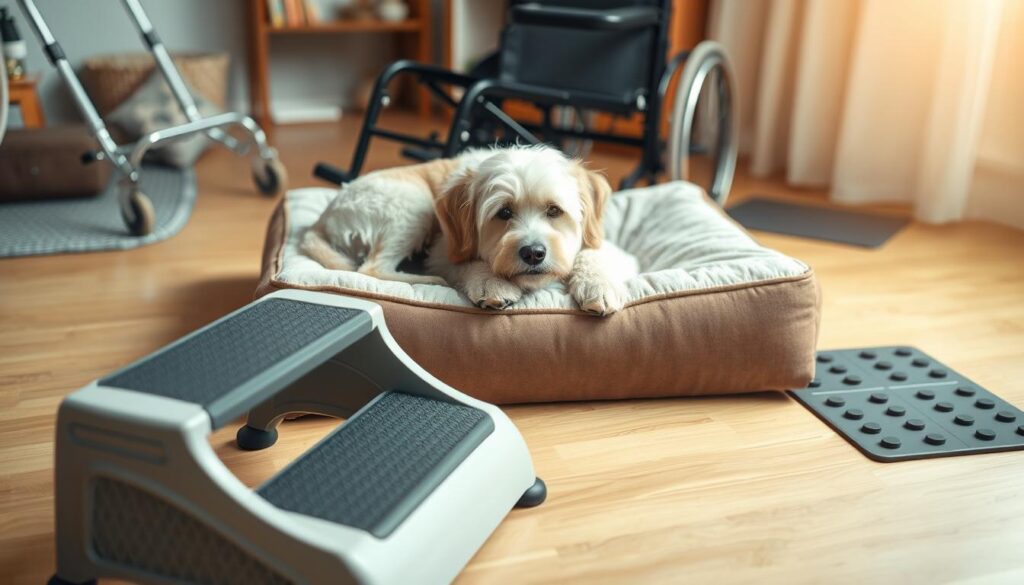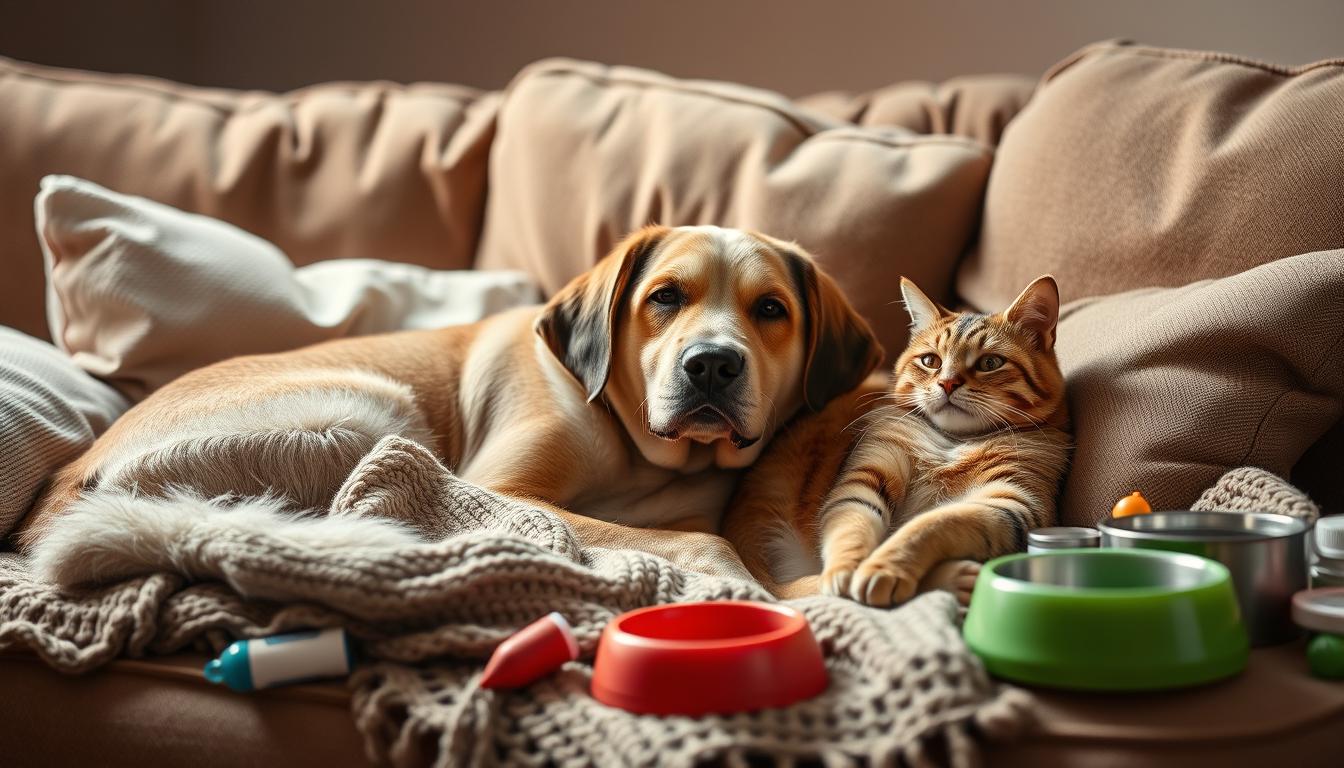As pets get older, they need more care. Aging pets require support to keep their life good.
Senior Paws Care offers the care and support aging pets need. This includes health checks, the right food, and ways to stay mobile. We also provide comfort and mental games, and make sure they see the vet regularly.
Knowing what your aging pet needs helps them live better. You can make their life better as they age.
Key Takeaways
- Comprehensive care is crucial for aging pets.
- Health monitoring and nutrition are key aspects of pet care.
- Mobility and comfort solutions improve the quality of life.
- Mental stimulation is vital for aging pets.
- Regular veterinary care is essential.
Understanding the Aging Process in Pets
It’s key to understand how pets age to give them the best care. As pets get older, their needs change. So, their care must also change.
When Is a Pet Considered “Senior”?
The age when a pet is called “senior” depends on their species and breed. Smaller dogs usually live longer than bigger ones. Cats often live longer than dogs.
For example, a big dog might be senior at 7 years old. But a small dog might not be senior until 10 years. Cats are usually senior around 12 years old.
Common Signs of Aging in Dogs and Cats
As pets age, they show changes in behavior, physical health, and health. Signs include moving less, eating less, gaining or losing weight, and sleeping differently. Spotting these signs early helps pet owners care for their aging pets better.
The Importance of Proactive Senior Pet Care
Proactive care means regular vet visits, watching for health changes, and adjusting their lifestyle. By being proactive, pet owners can keep their senior pets happy and healthy. They can manage health issues and make sure they get the care they need as they age.
Essential Health Monitoring for Senior Pets
As pets get older, their health needs grow more complex. It’s important to watch for changes in their behavior, how they move, and their physical state. This helps spot health problems early on.
Recognizing Changes in Behavior and Mobility
Senior pets often show changes in how they act and move. Watching their daily activities can reveal issues like arthritis, vision loss, or hearing problems. Look out for signs like:
- Reluctance to climb stairs or jump
- Changes in interaction with family members
- Increased sleeping or restlessness
Monitoring Weight and Appetite
Senior pets may experience weight changes and appetite shifts. Regular weighing and tracking their food habits can show health problems. For example, losing weight might mean dental issues or metabolic disorders.
Tracking Sleep Patterns and Energy Levels
Changes in sleep and energy levels are key signs of a senior pet’s health. Keeping a log of their sleep and activity can spot unusual patterns.
Setting Up a Health Journal
Keeping a health journal for your senior pet is very helpful. Record things like:
- Daily food intake and water consumption
- Changes in behavior or mobility
- Sleep patterns and energy levels
This info is great for vet visits, helping tailor care to your pet’s needs.
Nutrition Needs for Aging Pets
Aging pets need special food because they get older. Their metabolism slows down, and they need less energy. But, their diet must be just right for their age, size, and health.
Age-Appropriate Diet Considerations
Senior pets need food that’s full of good nutrients but not too many calories. Their food should be easy to digest to keep them healthy. For example, older pets might do well with a diet that has the right amount of protein to keep their muscles strong.
Nutritional adjustments for senior pets include:
- Lower calorie intake to prevent obesity
- Higher fiber content to support digestive health
- Antioxidants to combat oxidative stress
Supplements for Joint Health and Immunity
Supplements are very important for senior pets. For their joints, glucosamine and chondroitin are often suggested. Omega-3 fatty acids help reduce inflammation and keep them healthy overall.
Key supplements for senior pets:
- Glucosamine and chondroitin for joint health
- Omega-3 fatty acids for anti-inflammatory effects
- Probiotics for gut health and immunity
Hydration Importance and Strategies
Drinking enough water is key for senior pets. It helps keep their kidneys working well and keeps them healthy. To get them to drink more, try using water fountains or giving them multiple water sources.
Managing Medication Through Food
For pets with long-term health issues, mixing their medicine into their food can help. Some foods are made to help with conditions like arthritis or kidney disease. Always talk to a vet to figure out the best way to do this.
Understanding what older pets need to eat can really help their quality of life. Regular vet visits are important to make sure their diet is right for them.
Senior Paws Care: Mobility and Comfort Solutions
As pets get older, it’s important to focus on their mobility and comfort. Older pets often have trouble moving because of stiff joints and muscles. This makes simple tasks hard for them.

Joint Support and Pain Management
Helping pets with joint support and pain management is key. Supplements like glucosamine and chondroitin can help keep their joints healthy. They can also take medications to ease pain.
Creating an Accessible Home Environment
It’s vital to make the home accessible for pets with mobility issues. You can use ramps or stairs for them to reach their favorite spots. Also, orthopedic beds can provide extra comfort.
Assistive Devices for Mobility-Challenged Pets
Assistive devices like pet wheelchairs, harnesses, and slings are very helpful. They let mobility-challenged pets move around better. This helps them stay independent.
Massage and Physical Therapy Options
Massage and physical therapy are great for senior pets. They help keep pets flexible and reduce pain. Regular sessions improve circulation and reduce stiffness, boosting overall health.
By using these solutions, pet owners can greatly improve their aging pets’ lives. They ensure these pets stay comfortable and active.
Dental Health in Senior Pets
Keeping senior pets’ teeth clean is key to their health. As they get older, they face more dental problems. These can really hurt their quality of life.
Dental Issues in Aging Pets
Senior pets often get dental problems like tartar, gum disease, and tooth loss. These issues can cause pain and make eating hard. They can also lead to bigger health problems if not treated.
Common age-related dental issues include:
- Tartar buildup and gingivitis
- Periodontal disease
- Tooth root abscesses
- Oral tumors
Establishing Home Dental Care Routines
Home dental care is vital for senior pets. Brushing and dental chews can stop tartar and gum disease.
Tips for effective home dental care:
- Brush your pet’s teeth regularly with a pet-specific toothbrush and toothpaste.
- Use dental chews or toys designed to reduce tartar and plaque.
- Consider a water additive or oral spray for additional protection.
Professional Dental Care Options
Regular vet visits are crucial for senior pets. Veterinary dentists can clean teeth, find problems early, and teach home care.
Combining home care with vet visits helps keep senior pets healthy. This ensures they have good oral health and overall well-being.
Mental Stimulation and Enrichment
Keeping senior pets mentally active can greatly enhance their life quality. As they age, they might face confusion and anxiety due to cognitive decline.
Cognitive Decline in Aging Pets
Older pets may get lost, forget things, and act differently. Activities that challenge their minds can slow down this decline.
Brain Games and Activities
It’s vital to keep senior pets engaged with brain games and activities. Try puzzle toys, scent games, and interactive play to keep them sharp.
Maintaining Routines for Security
Keeping a regular routine is key for senior pets’ peace of mind. This includes set times for meals, exercise, and play.
Adapting Play to Physical Limitations
Older pets may not be as active as they used to be. It’s important to adjust play to fit their abilities. Puzzle toys and scent games are great options that don’t require a lot of energy.
| Activity | Benefit |
|---|---|
| Puzzle Toys | Challenges the mind, reduces boredom |
| Scent Games | Engages sense of smell, encourages exploration |
| Interactive Play | Stimulates mental and physical activity |
Veterinary Care for Senior Pets
As pets get older, they need more care from their vets. Regular check-ups are key to keeping them healthy and happy.
Recommended Check-up Frequency
Senior pets need to see the vet more often than younger ones. It’s best for them to go at least twice a year. This helps catch health problems early.
Bi-annual check-ups let vets keep a close eye on pets. They can adjust care plans and help keep pets healthy.
Important Screening Tests
Vets often suggest tests during these visits. These tests help find health issues early. They might include:
- Complete Blood Count (CBC) to check for anemia, infection, and other blood-related disorders.
- Blood Chemistry Tests to assess the functioning of organs such as the liver and kidneys.
- Urinalysis to detect urinary tract infections, kidney disease, and other conditions.
These tests give a full picture of a pet’s health. This helps vets act quickly if needed.
Managing Chronic Conditions
Senior pets often face chronic conditions like arthritis or diabetes. Owners and vets must work together to manage these. This might mean medication, lifestyle changes, and regular check-ups.
“The key to managing chronic conditions in senior pets is early detection and consistent management. By working closely with your veterinarian, you can help improve your pet’s quality of life.”
Finding Senior-Friendly Veterinarians
Finding a vet who knows about senior pets is important. A good vet for seniors will tailor care to meet their needs. Look for a vet who is experienced with seniors, answers your questions, and makes your pet feel comfortable.
| Characteristics | Senior-Friendly Veterinarian | Standard Veterinarian |
|---|---|---|
| Experience with Senior Pets | Highly experienced, understands age-related issues | General experience, may not specialize in senior care |
| Approach to Care | Tailored care plans, considers quality of life | Standard care protocols, may not adapt to senior needs |
| Communication | Clear, empathetic, and comprehensive | May be less detailed or less empathetic |
End-of-Life Considerations and Difficult Decisions
As our furry friends age, we face tough decisions about their end-of-life care. This is emotionally hard for pet parents. But, it’s key to focus on our pets’ comfort and happiness.
Quality of Life Assessment
Checking a senior pet’s quality of life means looking at their health, comfort, and daily activities. We should think about pain, mobility, appetite, and hygiene. A quality of life assessment helps us make the best care choices for our pets.
| Criteria | Good Quality of Life | Poor Quality of Life |
|---|---|---|
| Pain Level | Minimal or manageable pain | Severe or unmanageable pain |
| Mobility | Able to move around comfortably | Difficulty walking or standing |
| Appetite | Eats well and enjoys food | Lack of interest in food or difficulty eating |
Palliative Care Options
Palliative care aims to ease symptoms, pain, and stress of serious illnesses. For senior pets, it can make their life better by managing pain and discomfort. Care options include pain meds, physical therapy, and therapies like acupuncture.

Making Decisions with Compassion
Deciding on end-of-life care for our pets needs compassion and understanding. We should think about their quality of life and talk to our vet. We need to weigh the pros and cons of different care options.
Grief Resources for Pet Parents
When we lose a pet, it’s a big loss. Pet parents often need support to deal with their grief. There are groups, counseling, and online forums that offer comfort and help during this hard time.
Conclusion
As pets get older, they need more care. Senior Paws Care helps owners give their aging pets the best life. Understanding aging and taking action can greatly improve their quality of life.
A good care plan includes regular health checks, the right food, and comfort solutions. It also means keeping their minds active and getting the right vet care. Working with vets helps owners meet their pet’s specific needs.
By focusing on pet wellness and a complete care plan, owners can make their senior pets happy and comfortable. This means creating a caring home, managing health issues, and making smart care choices. With Senior Paws Care, owners know they’re doing everything they can for their pets.
FAQ
What is considered a senior pet?
The age of a senior pet depends on the species, breed, and size. Smaller dogs live longer than big ones. Cats usually outlive dogs.
How often should I take my senior pet to the veterinarian?
Senior pets need more vet visits. It’s best to go at least twice a year for a check-up.
What are some common signs of aging in dogs and cats?
Signs of aging include changes in appetite and behavior. You might also notice weight changes, less energy, and sleep pattern shifts.
How can I support my senior pet’s joint health?
Support joints with supplements and medications. Keep a healthy weight. Make their living space comfy and use aids for mobility.
What are some ways to provide mental stimulation for my senior pet?
Use brain games and activities. Stick to routines. Adapt play to fit their physical limits to keep them engaged.
How can I manage my senior pet’s chronic conditions?
Work with your vet to manage chronic conditions. This might mean medication, lifestyle changes, and regular check-ups.
What are some important screening tests for senior pets?
Key tests include blood work, urinalysis, and imaging. They help catch health issues early.
How can I assess my senior pet’s quality of life?
Check their comfort, mobility, and overall well-being. Talking to a vet can guide you on what to do next.
What are some palliative care options for senior pets?
Options include pain management and hospice care. These help improve their quality of life.
How can I cope with the loss of my senior pet?
Use grief resources like counseling and support groups. They help pet owners deal with their loss.










